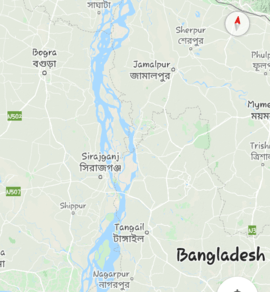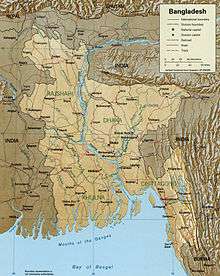1996 Bangladesh tornado
1996 Bangladesh tornado was a deadly and destructive tornado that struck 80 - 90 villages in north-central Bangladesh on 13 May 1996, leaving more than 600 fatalities[3] with over 37,248 injured, and 36,420 houses were extensively damaged[4] within 20 minutes of its arrival at 125 mi/h.[5] The tornado arrived through Jamalpur, Sirajganj and Tangail districts[6] that affected numerous families across the villages, 100,000 people went homeless [7][8] and more than 6,787 livestock were killed. Initial reports cited between 400 and 443 dead with 32,000 injured.
 Map of tornado-affected districts of Bangladesh | |
| Type | Tornado |
|---|---|
| Formed | 3 May 1996 |
| Dissipated | May 03 |
| Tornadoes confirmed | disastrous |
| Max. rating1 | F2 tornado |
| Duration of tornado outbreak2 | 20 – 30 minutes |
| Highest winds |
|
| Damage | unknown |
| Casualties | 600 dead 100,000 homeless 36,420 homes destroyed 37,248 injured |
| Areas affected | Tangail Jamalpur Sirajganj[2] |
| 1Most severe tornado damage; see Enhanced Fujita scale 2Time from first tornado to last tornado | |
Before the tornado arrived, locals witnessed heavy hailstones across the affected areas. Strong winds lifted several people away, and one person was blown and dropped 1.5 kilometers away @28 mph. It also uprooted trees and damaged the houses completely, mostly mudbrick-huts built by the villagers on the banks of river.[9]
Background
Bangladesh is one of the most vulnerable countries in the world to various natural disasters, including frequent occurrences of cyclones, storm surges, tornadoes, tornado outbreaks, devastating floods and maritime disasters. Due to its frequent climate changes, it is recognized eighth vulnerable country in the history of world natural disaster.[10][11] On May 13, 1996, tornado originated in north central of the country through Jamalpur, Sirajganj and Tangail districts of Dhaka. Due to its immense speed and 20 minutes of large destruction, it was declared the deadliest tornado, affecting the 90 villages of the country in forty years of Bangladesh's history. Several people died due to disease infection, head injuries, and lack of sanitary countermeasures and emergency assistance.[4][12] The New York Times described "tree branches transformed into missiles by the 125 mile-per-hour winds".
Emergency response
The survivors accused the administration for not providing timely assistance, leading to count more tolls. Despite being a hotspot of tornadoes, disaster response was never exercised in 1990s. People claimed that authorities left several survivors alone in an attempt to search for the missing bodies and arrange their burial preparations.[13] NGOs and neighboring people were actively involved in emergency assistance and the victims where possible, received disaster relief from the Bangladesh Red Crescent Society and government agencies. The International Federation of Red Cross and Red Crescent Societies (IFRC) was also providing medical assistance and dispatching relief materials to the tornado victims.[6][14][15]
References
- Hossain, Farid (May 15, 1996). "BANGLADESH TORNADO KILLS 440" – via www.washingtonpost.com.
- "BANGLADESH TORNADOES information 17 May 1996" (PDF).
- "The Deadliest Tornado in the World". The Weather Channel.
- "Bangladesh: Tornado - Information Bulletin n° 3 - Bangladesh". ReliefWeb.
- Kunii, Osamu; Kunori, Takeaki; Takahashi, Kodo; Kaneda, Masaki; Fuke, Nobuo (September 1996). "Health impact of 1996 tornado in Bangladesh". The Lancet. 348 (9029): 757. doi:10.1016/S0140-6736(05)65669-3. PMID 8806315. S2CID 31624153.
- Paul, Bimal Kanti (August 1, 1998). "Coping with the 1996 Tornado in Tangail, Bangladesh: An Analysis of Field Data". The Professional Geographer. 50 (3): 287–301. doi:10.1111/0033-0124.00121.
- Davis, Lee Allyn (March 25, 2008). Natural Disasters. Infobase Publishing. ISBN 9781438118789 – via Google Books.
- Assistance, United States Agency for International Development Office of U. S. Foreign Disaster (March 25, 1996). "OFDA Annual Report". Office of U.S. Foreign Disaster Assistance, Agency for International Development – via Google Books.
- Spilsbury, Louise; Spilsbury, Richard (July 15, 2008). Hurricanes and Tornadoes in Action. The Rosen Publishing Group, Inc. ISBN 9781404218635 – via Google Books.
- "Bangladesh 8th worst-hit country by natural disasters". The Daily Star. March 12, 2019.
- "Bangladesh Disaster Risk and Climate Resilience Program - Bangladesh". ReliefWeb.
- "Bangladesh Tornado Leaves 443 Dead". Los Angeles Times. May 15, 1996.
- "Death Toll in Bangladesh Tornado Rises to at Least 443". The New York Times. Associated Press. 15 May 1996.
- Mustafa, Sabir (14 May 1996). "Bangladesh tornado toll hits 165". UPI.
- Paul, Bimal Kanti (August 1998). "Coping with the 1996 Tornado in Tangail, Bangladesh: An Analysis of Field Data". The Professional Geographer. 50 (3): 287–301. doi:10.1111/0033-0124.00121.
